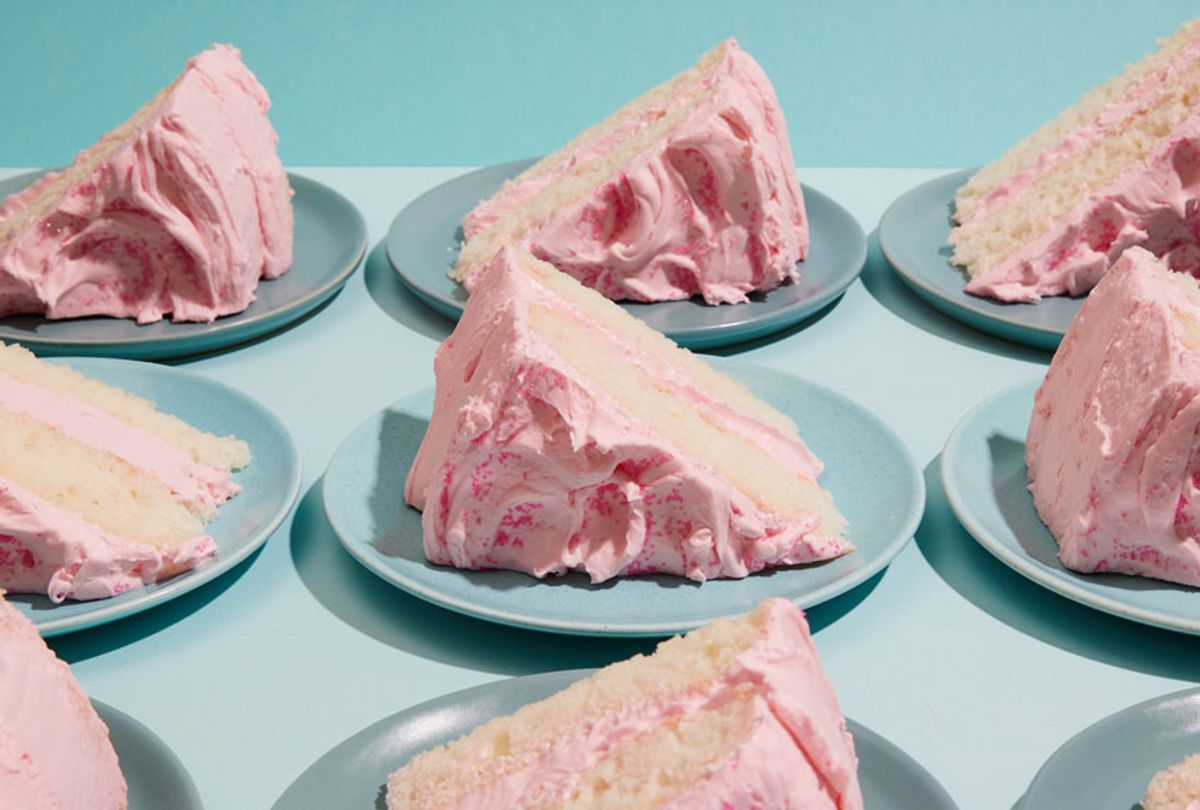I have always been, and will always be, team chocolate. My birthday cake is always chocolate (or at the very least has chocolate frosting) and my favorite cookie is — duh — chocolate chip. But while paging through my vintage recipe booklets when researching my latest cookbook, "The Vintage Baker," I kept stumbling upon recipes for white cake with vanilla frosting (often referred to as “silver” or “white moon” cake), and knew I needed to include one in my book (one of the factors I looked at when choosing recipes for the book, was the frequency with which the recipes appeared in my pamphlets). The cake is incredibly moist from the inclusion of shortening, in addition to the butter, and has a secret ingredient: ice water, which makes for the most tender of crumbs. The frosting is an old-fashioned American buttercream that I recommend beating for longer than you might think necessary, to insure the fluffiest and lightest of icings. I recommend tinting said frosting pink (my favorite color, if you must know) but feel free to tint as you see fit. The cake is a spectacular celebration cake and will convert even the most die-hard of chocolate fanatics, into silver cake lovers (and, I speak from experience . . . ).
Silver Cake with Pink Frosting from "The Vintage Baker," by Jessie Sheehan
Serves 16
Cake
2 1⁄4 cups cake flour, sifted
2 tsp baking powder
1⁄2 tsp baking soda
1 tsp table salt
1⁄2 cup vegetable shortening
1⁄4 cup unsalted butter, at room temperature
2 tsp pure vanilla extract
1 1⁄2 cups granulated sugar
1 cup ice water
4 egg whites, stiffly beaten
Pink Buttercream
1 1⁄2 cups unsalted butter, at room temperature
1⁄2 tsp table salt
6 cups [720 g] confectioners’ sugar, sifted
2/3 cup whole milk or heavy cream
4 tsp pure vanilla extract
Red food coloring, optional (but so pretty)
Pink sanding sugar for decorating
Preheat the oven to 350°F. Grease two 9-in- by-2-in round cake pans with non- stick cooking spray or softened butter. Line with parchment paper and grease again.
For the cake, in a medium bowl, whisk together the flour, baking powder, baking soda, and salt. In the bowl of a stand mixer fitted with the paddle attachment, beat the shortening, butter, and vanilla on medium to medium-high speed until fluffy and light, 2 to 3 minutes, scraping down the bowl with a rubber spatula as needed. Add the granulated sugar and continue beating for another 3 to 5 minutes, until the mixture doubles in volume.
Decrease the speed to low and add the dry ingredients in three additions, alternating with two additions of the water, scraping down the bowl as needed with a rubber spatula. Stop the mixer when there are still streaks of flour in the batter. Finish mixing by hand, adding the egg whites in three stages, and folding them in with a rubber spatula.
Transfer the batter to the prepared pans and bake for 20 to 25 minutes, rotating at the halfway point. The cakes are ready when a cake tester comes out with a few moist crumbs and the cake has just started to come away from the sides of the pan. Let cool for about 20 minutes, and invert the cakes right-side up onto cooling racks. Let the cakes cool to room temperature.
The cakes can be tightly wrapped in plastic wrap and stored on the counter for up to 1 day.
For the buttercream, in the cleaned bowl of the stand mixer fitted with the paddle attachment, beat the butter on medium speed until smooth and soft. On low speed slowly add the salt and 2 cups of the confectioners’ sugar, scraping the bowl periodically with a rubber spatula. Add one-fourth of the milk and mix until incorporated. Continue mixing in this manner, adding the remaining confectioners' sugar and milk, until the frosting is fluffy and spreadable.
Add the vanilla and a few drops of food coloring, if using, and continue mixing on medium-low to medium speed for at least 5 minutes, until fluffy and stable. A longer mixing time results in exceptionally light frosting. The frosting will keep on the counter in an airtight container for up to 1 day, but may need to be re-whipped in a stand mixer before using.
Generously frost the cooled cake layers with the buttercream, using an offset spatula or butter knife. If you do not want a thickly frosted cake, you will have leftover frosting. Sprinkle sanding sugar on top of the first frosted layer, before placing the second on top of it, and on the top and sides of the frosted cake once you are done. Slice the cake using a long serrated knife.
The cake will keep, lightly covered in plastic wrap, on the counter for up to 3 days.



Shares